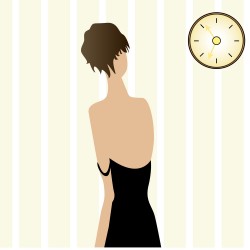Night Eating Syndrome
Night eating syndrome is a type of eating disorder in which afflicted people constantly eat throughout the night but do not eat much or at all during the day. The disorder was first recognized by Dr. Albert Stunkard in 1955 and he has been the leader in researching the disorder and advocating for its inclusion in the DSM. Dr. Stunkard believes that night eating syndrome is a combination of three types of mental health disorders: a mood disorder, eating disorder and sleep disorder.
Night eating syndrome should not be mistaken for nocturnal sleep related eating disorder, a sleep disorder characterized by eating while asleep. Some experts believe that night eating syndrome and nocturnal sleep related disorder may be linked or the same disorder.
Diagnosis Criteria:
Night eating disorder is currently not recognized by the DSM IV or ICD 10 as a mental health disorder. However, experts have laid out certain criteria for diagnosing night eating disorder. They include:
- Eating excessive amounts of food in the late evening or night; a minimum of ¼ of daily caloric intake occurring during this time.
- Nighttime foods eaten are primarily carbohydrates
- Suffer from insomnia
- Does not eat in the morning for several hours; first daily meal is often not until after noon
- Wakes up with indigestion or heartburn
- Has distress as a result of nighttime eating
- Feels guilty about eating habits and does not enjoy the nighttime eating
These symptoms should persist for a minimum of two months in order to meet diagnostic criteria as a disorder. Further, the symptoms must cause the person significant distress in order to meet the requirements of an eating disorder.
What Causes Night Eating Syndrome?
 Experts believe that night eating syndrome is caused by hormone and chemical imbalances in the brain, not from behavioral problems such as a food addiction. Studies of patients diagnosed with night eating syndrome have shown that they have low levels of the hormones melatonin and leptin at night, which are linked to sleep and hunger regulation. Their levels of the hormone cortisol were elevated, which is linked to stress.
Experts believe that night eating syndrome is caused by hormone and chemical imbalances in the brain, not from behavioral problems such as a food addiction. Studies of patients diagnosed with night eating syndrome have shown that they have low levels of the hormones melatonin and leptin at night, which are linked to sleep and hunger regulation. Their levels of the hormone cortisol were elevated, which is linked to stress.
Dr. Stunkard believes that people with night eating syndrome are consuming carbohydrates as a natural self-medicating technique. When carbohydrates are eaten, the body produces more insulin which in turn increases the level of the natural chemical tryptophan. These chemicals are used for making serotonin, a neurotransmitter which is directly linked with feelings of well being. Serotonin is then converted into the hormone melatonin which helps promote sleep. By eating carbohydrates, people with night eating syndrome are counteracting their melatonin imbalances.
Prevalence of Night Eating Syndrome:
Though there have been few significant studies into the prevalence of night eating syndrome, all reports thus far show that the disorder is common. Amongst the general population, about 1.5% of adults likely have night eating disorder. Amongst people seeking to lose weight, the disorder is much more prevalent at estimates of 6 to 16%. Up to 42% of people seeking bariatric surgery for weight loss have night eating syndrome. Evidence shows that night eating syndrome is more prevalent in women than men. There is no evidence that night eating syndrome exists amongst children or adolescents.
Treatments for Night Eating Syndrome:
Many people with night eating syndrome may not realize that they have a mental health disorder, instead thinking that they have a weight problem. They are more likely to seek treatment for weight loss rather than for the underlying problem. As night eating syndrome is believed to be caused by chemical and hormonal imbalances in the brain, weight-loss programs or behavioral modification methods are likely to be effective in treating this disorder.
When night eating syndrome is diagnosed, it is most commonly treated with medications. As people afflicted with the disorder have low levels of the natural chemicals melatonin and leptin, it is possible that these chemicals can be used as treatment. Most commonly though, selective serotonin reuptake inhibitor (SSRI) antidepressants are prescribed for night eating syndrome. These SSRI antidepressants work by slowing down the process of re-absorption of serotonin after it has been released in the brain, thus making more of it available. Serotonin gets converted into melatonin which promotes sleep.
Complications from Untreated Night Eating Syndrome:
People with night eating syndrome tend to eat about 500 more calories daily than their recommended intake. Thus, it is very common for people with night eating syndrome to become overweight or obese. Unhealthy excess weight can lead to serious problems such as diabetes, high blood pressure, and heart disease. Further, people with night eating syndrome are not getting adequate sleep which can make then extremely fatigued during the day. Over time, lack of sleep can lead to other health problems including stress, psychological problems and physical harm from injuries. The combination of obesity and stress related to sleep deprivation can be very dangerous and increase the likelihood of serious health complications.
References:
American Psychiatric Association. (2000). Diagnostic and Statistical Manual of Mental Disorders (Revised 4th ed.). Washington, DC: Author.
Stunkard, A.J., Grace, W.J., and Wolff, H.G. “The night-eating syndrome. A pattern of food intake among certain obese patients.” American Journal of Medicine 19 (1955): 78-86.
Birketvedt, G.S., Florholmen, J., Sundsfjord, J., Osterud, B., Dinges, D., Bilker, W., and Stunkard, A. “Behavioral and neuroendocrine characteristics of the night-eating syndrome.” Journal of the American Medical Association 282 (1999): 657-663.





